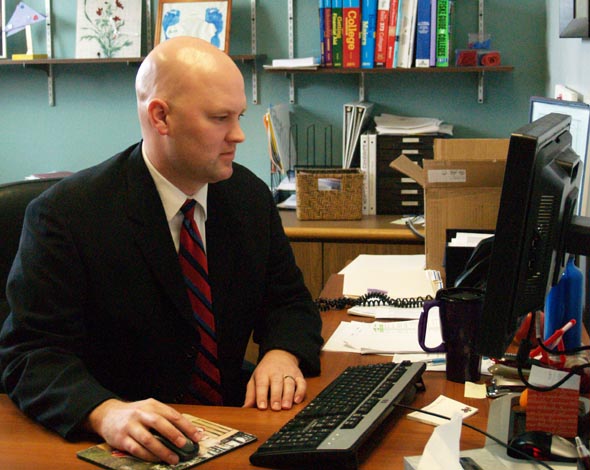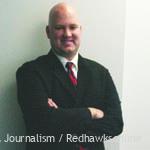Bjorklund works for social improvement
M.A. counselor’s other job gives him perspectives few students see
by Maggie Pelissero
Talon staff writer
“I decided I wanted to try to work with kids before they got into trouble or maybe after they were done serving some time, and then help them reintegrate back into society and be positive,” said the man who’s better known to Minnehaha students for assistance in the college application process, “Then that’s where the idea of school counseling came into play.”
 Kids ages 10 to 18, reside there for many reasons, varying from assaults to mental illnesses that don’t permit them to be active in society. Some will stay in the system from when they’re young to when they become an adult, while others will manage to improve their lives.
Kids ages 10 to 18, reside there for many reasons, varying from assaults to mental illnesses that don’t permit them to be active in society. Some will stay in the system from when they’re young to when they become an adult, while others will manage to improve their lives.
Caleb Bjorklund, one of Minnehaha’s guidance and college counselors, is also a part-time employee with the Ramsey Country Juvenile Detention Center, where he works with kids facing difficult challenges and prospects.
“Right out of college I began working in juvenile corrections,” said Bjorklund. “During college I had an internship at another correctional facility, and then was hired part-time and then full time with Ramsey County,” said Bjorklund. He went back to graduate school to get his masters in psychology at St. Cloud State and currently works part-time at the juvenile detention center, approximately 16-24 hours per month, mostly on weekends.
Bjorklund’s job at the detention center varies on a day-to-day basis. When he walks into work he looks at a board to see his name and the job he is assigned for the day. Some days are spent in the control room, regulating the doors and monitoring cameras around the facility. Other days are spent answering phones. However, Bjorklund is also assigned to work directly with the kids. He may be assigned to a living unit where he may help out during recreation time, dispense medications and monitor visiting.
The job also has its frustrations.
“The one thing about working there,” Bjorklund said,” is if you’re successful in helping someone, you probably won’t see them again. So, you don’t see your successes.”
But he still finds his job rewarding.
“That doesn’t mean everyone you see is a failure, it just means that next you see them maybe you’ll be able to help them a little bit,” he said, “I’ve seen kids grow up in that system.”
Bjorklund left the juvenile center for about five years and when he came back to work at Minnehaha, he was able to be hired part-time again at the juvenile center. Bjorklund explained that there were residents he saw when they were 12, who when he came back were now 18 years old. “You see changes,” Bjorklund said, “and usually positive changes.”
Hearing the words “juvenile detention center” tends to raise eyebrows and an immediate thought may be: Isn’t that a dangerous job? However, Bjorklund explained that he has never truly felt unsafe during his years of working there.
Usually the makeup of the kids and their interaction with each other is what causes a situation to be potentially harmful. Bjorklund and his coworkers have been given basic training on self-defense and protecting others. They have also learned strategies of how to intervene carefully in situations. Luckily, many people on staff are present when any situation does arise requiring the attention of adults.
The job atmosphere at Minnehaha versus the juvenile detention center is extremely different but they do have the common ground of working with kids. Bjorklund said he has gained quite a lot of perspective by working with different types of kids. If he has a bad day at school, he can simply compare it to a bad day of one of the kids he has dealt with.
Having two part-time jobs involving working with teenagers helps Bjorklund to relate his experiences from one job to another.
“I take perspective in going to work with them and maybe help build some assets, some positive character traits, and then I can also bring some of my experiences there back here,” said Bjorklund, “and help students here get some perspective as to if they’re going through a crisis, let’s take it outside this situation. How does your situation or your life experiences, relate to someone who doesn’t have a private- school education, who doesn’t maybe have a relatively stable family home, who’s worried about things like food and shelter and things like that versus what college they’re going to get into?”
One of the benefits of working at Minnehaha is that Bjorklund is able to build trust with his students because he sees them on a regular basis,
“I love Mr. Bjorklund,” said Senior Vera Levin about her counselor, “I think he does a really good job and is really relatable and approachable.”
However at the juvenile detention center if he works twice a month, he may be exposed to an entirely new group of residents that are unaware of who he is, making it difficult to “show them I’m worthy of their trust,” said Bjorklund.
Having the support of his wife, Mackenzie, and his flexible work schedule is also key in balancing the two part-time jobs Bjorklund has. Mackenzie said she feels as though working with these kids gives her husband a “different and healthy perspective” of the hardships teenagers face. Bjorklund is able to be flexible because he is able to tell the juvenile detention center when he is available during school breaks and over the summer, and if they have a need for him at that time then it’s a good time for him to work.
Bjorklund is able to use the experiences and perspectives he has from working both at Minnehaha and at the Ramsey juvenile detention center in order to help the kids and students at each place more. He truly cares for all his students and wants to see them prosper in life.
” I don’t do this for personal gratification,” he said, “I do it because I value the students and residents and want them to do well.”

